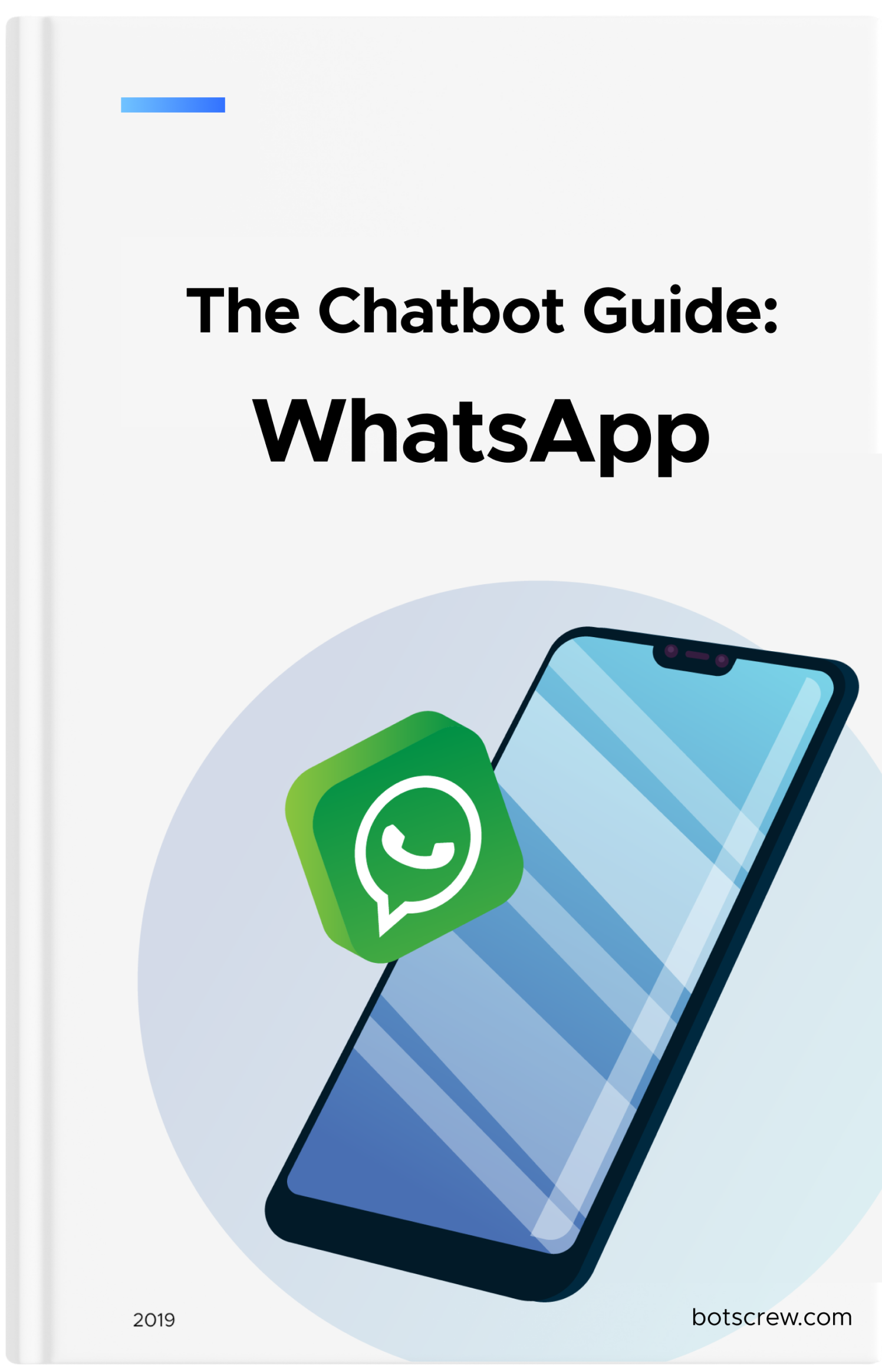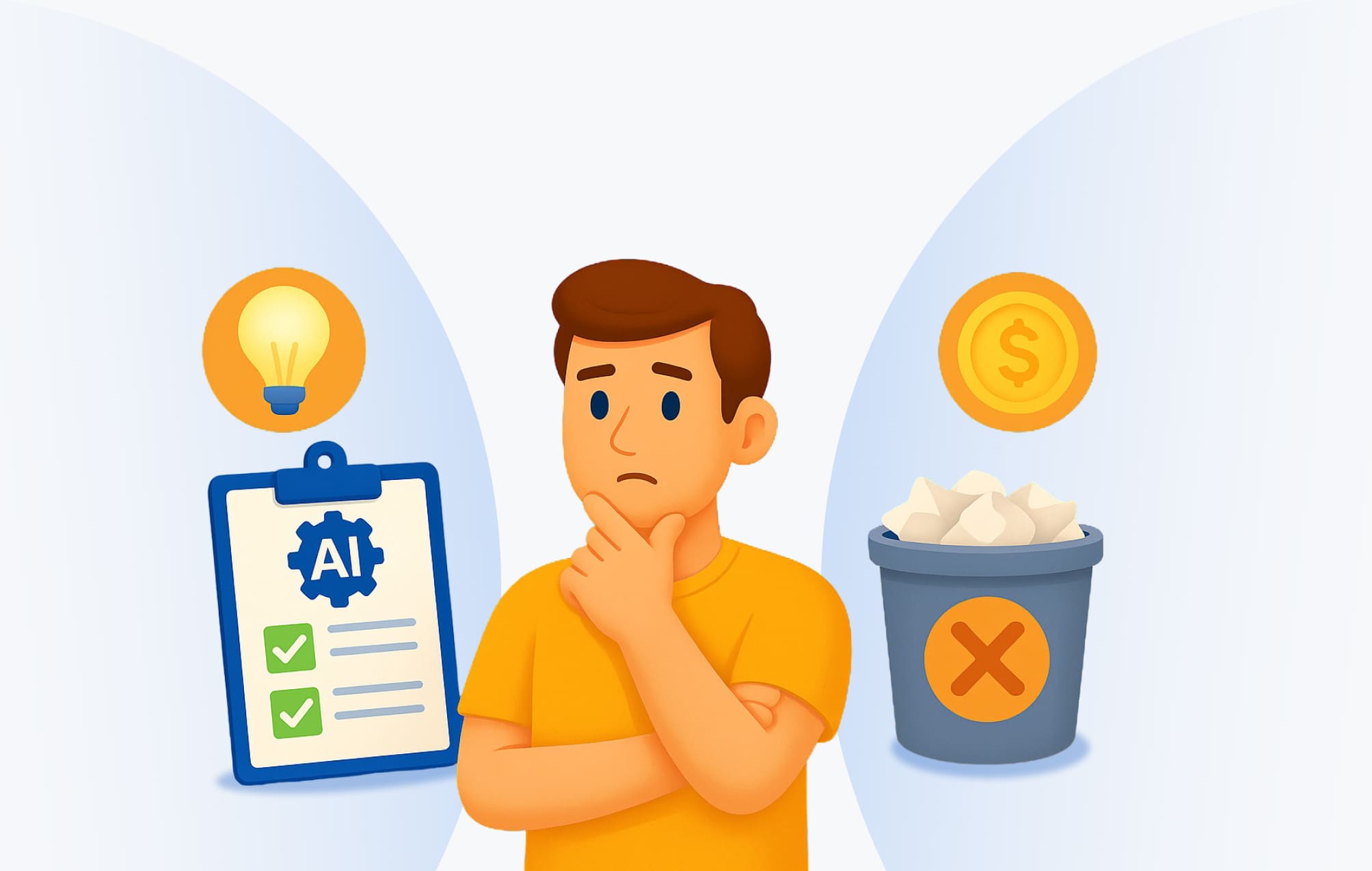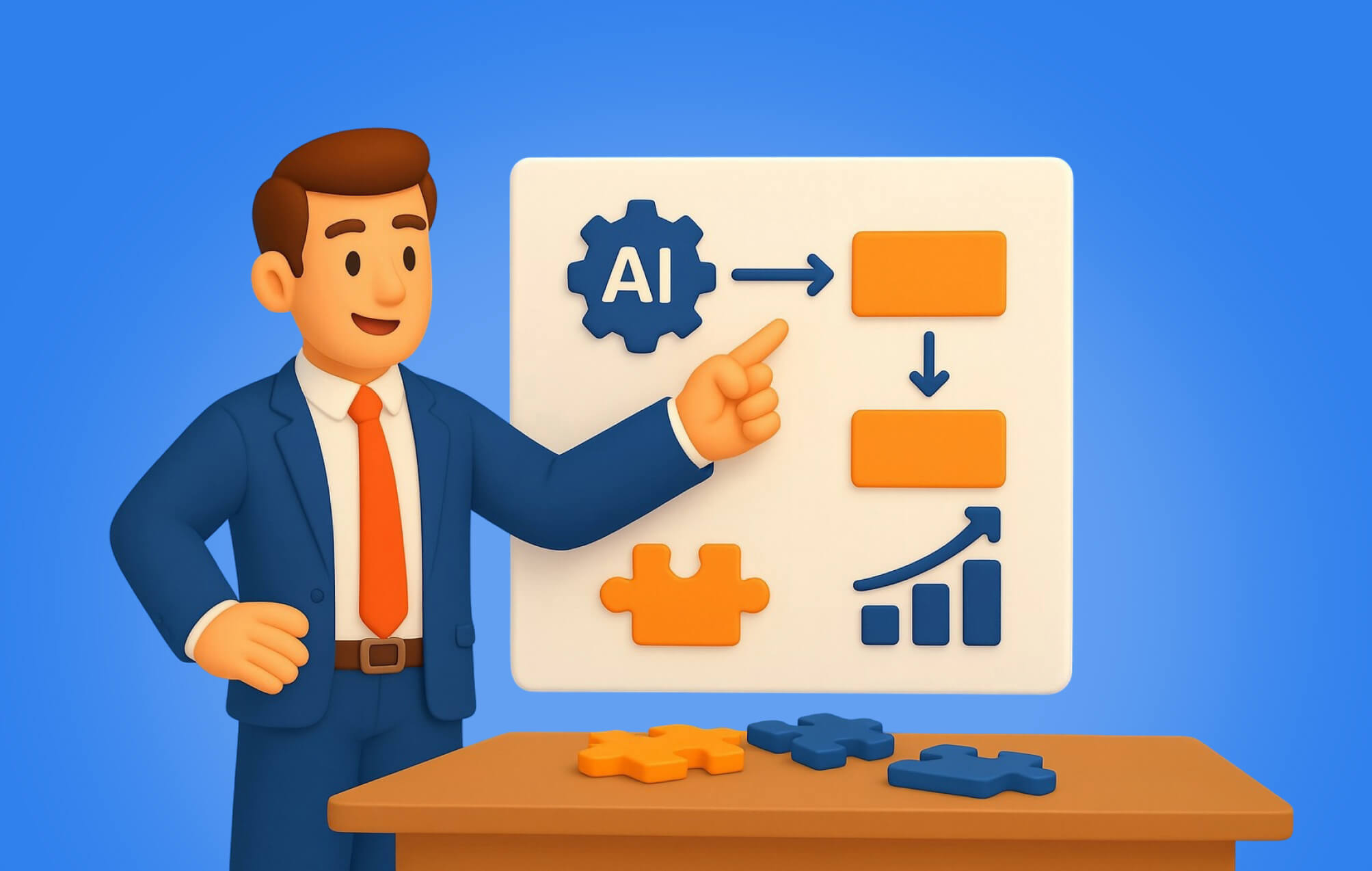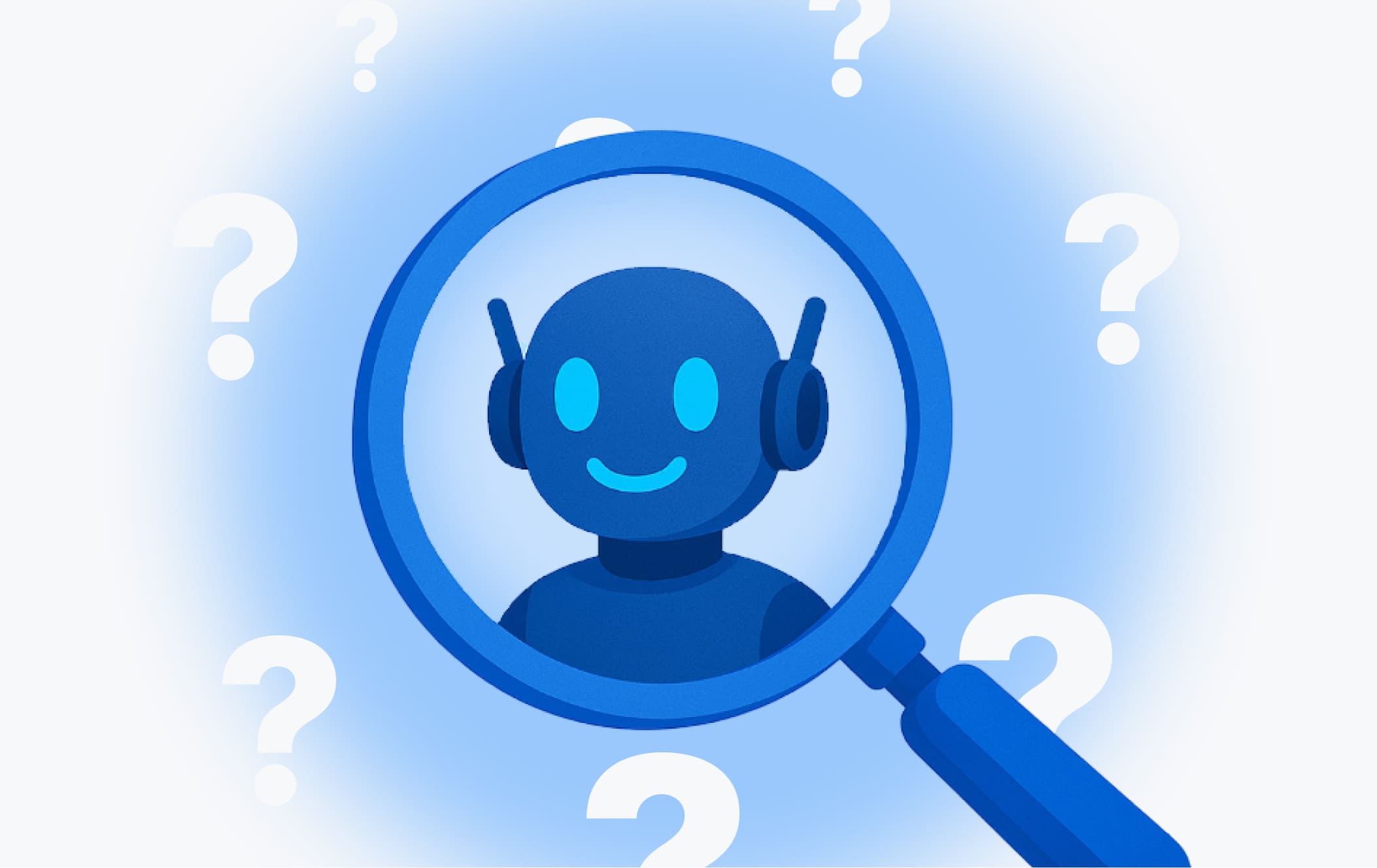The Anatomy of AI Pricing: Understanding the True Cost of AI Development
From a simple chatbot to an enterprise-grade AI agent — can $5K buy you a custom AI solution in 2025? Are AI projects still multi-million-dollar, multi-year undertakings, or has the cost of AI dropped to where solutions can be built in weeks for a fraction of the price? The answer depends — on your goals, your data, and the level of intelligence you expect your AI to deliver.
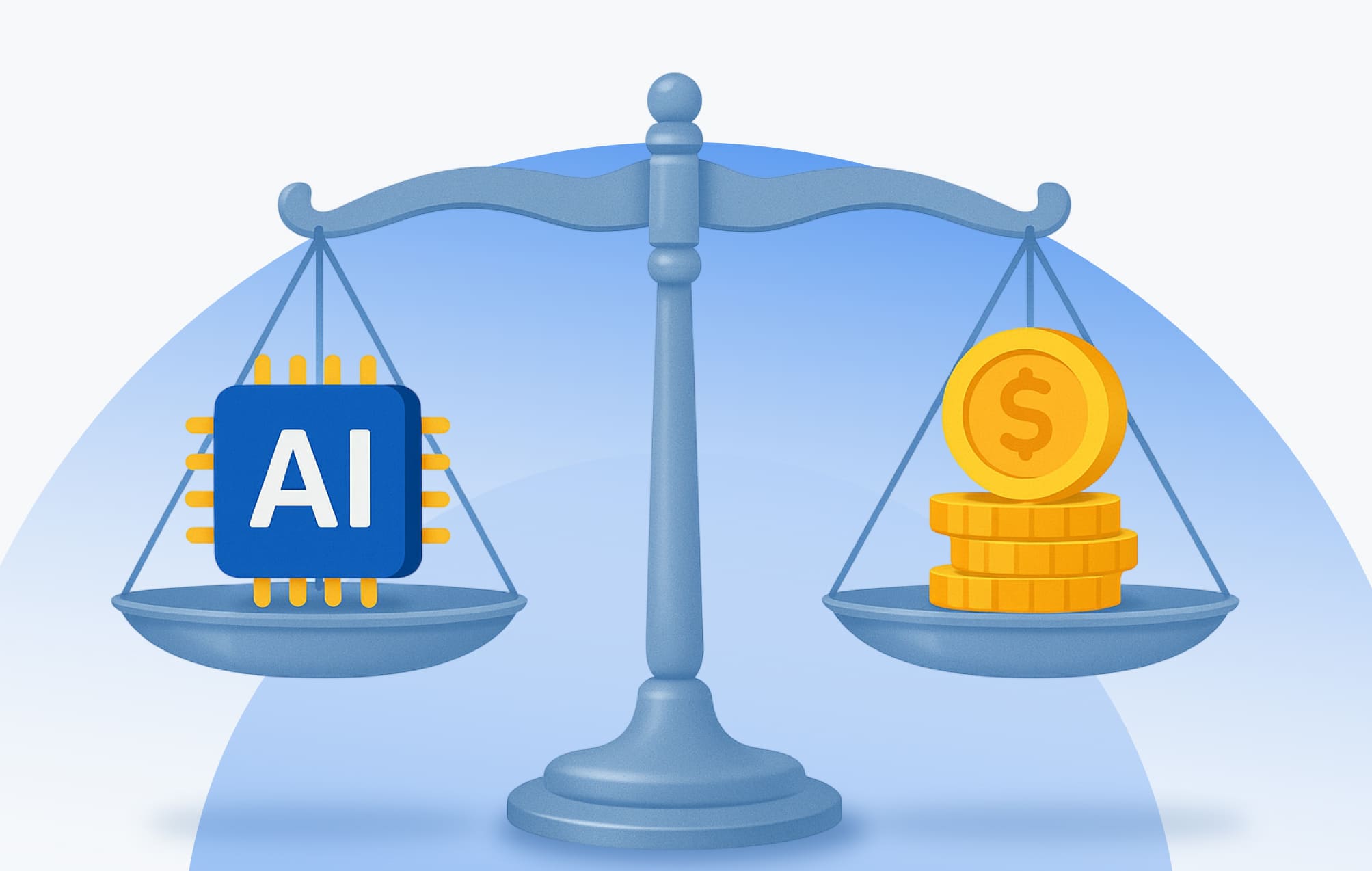
If you are still asking when your company should embrace generative AI, the short answer is — yesterday. Yet every boardroom conversation circles back to the same question: Why do AI development costs range anywhere from $5,000 to over half a million dollars? And what exactly am I paying for?
This guide breaks down the real cost of AI development — from data readiness and model complexity to integration depth and post-launch support. You'll discover how much AI costs, where your budget goes, how to avoid scope creep, and what separates a pilot experiment from a scalable enterprise-grade solution. Whether you operate in retail, healthcare, fintech, logistics, or manufacturing, you will find clear, strategic insights to plan smarter, invest confidently, and maximize ROI on your next AI project.
Can You Build AI for $5K? Let's Set the Record Straight
How expensive is AI? Technically, you can create something for $5K. But to understand the cost of AI development, it's important to know what that budget actually covers. At this level, you might build a simple prototype, a chatbot wrapper, or an AI-powered demo using existing APIs.
These are ideal for investor presentations or internal proof-of-concept, but they fall far short of a production-grade AI solution. And as usage grows, operational costs rise quickly — even something as simple as OpenAI API calls can become expensive when serving multiple users or processing large data volumes.
A real AI solution — one that's custom, secure, tailored to your business logic, and capable of scaling — involves proper architecture design, fine-tuned models, and ongoing optimization. That is why most serious AI projects reviewed on Clutch fall in the $10,000–$49,000 range for the cost of AI development — and that's just the starting point for enterprise-grade implementations.
⚠️ Important Trade-Off: Off-the-shelf AI tools offer a quick, low-cost entry point — but the cost of generative AI can rise sharply as usage scales. Custom-built solutions require a higher upfront investment but provide full control over infrastructure, data, and compute resources, making long-term expenses far more predictable and sustainable.
Why Is AI So Expensive (Sometimes) & What Shapes the Cost of AI
When planning your AI project budget, it's not just about how much does artificial intelligence cost — it is about understanding what actually drives the price. The cost of AI is shaped by a series of strategic and technical factors that determine how sophisticated, scalable, and secure your final solution will be.
Workflow Complexity and Number of Integrations
💡 The more intricate your workflows, the more complex — and expensive — the AI becomes. Accurate AI cost estimation starts with understanding the number of systems your solution must connect with.
At the heart of any AI-agent solution lies a simple truth: the number of systems it needs to connect with determines both the scope and depth of development. If your AI only needs to retrieve data from a single source and deliver basic responses, it's a relatively straightforward build.
However, if your agent must pull information from multiple systems, perform real-time calculations, forecast trends, and deliver tailored recommendations — that's an entirely different architectural challenge. Each additional integration, API, and data pipeline adds layers of complexity — demanding more time, precision, and engineering resources to ensure data flows securely and seamlessly.
Organization Size and AI Adoption Readiness
💡 Your company's size and digital maturity directly influence the cost of implementing AI.
Smaller organizations (typically under $10 million in turnover) tend to have simpler operations, fewer systems, and cleaner data flows — making AI adoption faster and more affordable. Larger enterprises, however, bring scale — and with it, intricate workflows, legacy systems, and high security requirements. These factors not only elevate the technical complexity but also the reliability standards that the AI solution must meet.
In other words, the larger and more interconnected your business, the greater the investment required to ensure your AI operates safely and effectively across departments.
Feeling overwhelmed by AI cost variables? Get a tailored cost breakdown aligned with your project scope, data maturity, and infrastructure setup.
Intellectual Property Requirements (IP)
If your company wants to own 100% of the intellectual property, you are asking your development partner to build from the ground up. That means no shortcuts, no prebuilt frameworks, and no open-source libraries — just original architecture and custom code designed exclusively for you.
This ensures full control, but it comes with a premium price tag. By contrast, being open to leveraging proven frameworks or semi-custom solutions can cut both development time and cost dramatically — without sacrificing performance.
Support and Operational Expenses
💡 The initial build is just the beginning. The true cost of implementing AI in business emerges once your solution goes live.
Three factors tend to grow with adoption:
#1. Cloud Infrastructure: More users mean more computational power and higher server costs.
#2. AI Model Usage: Token or API usage fees scale with activity and data volume.
#3. Third-Party Integrations: Services like WhatsApp, Zapier, or SMS gateways often charge per use — and those micro-fees multiply quickly.
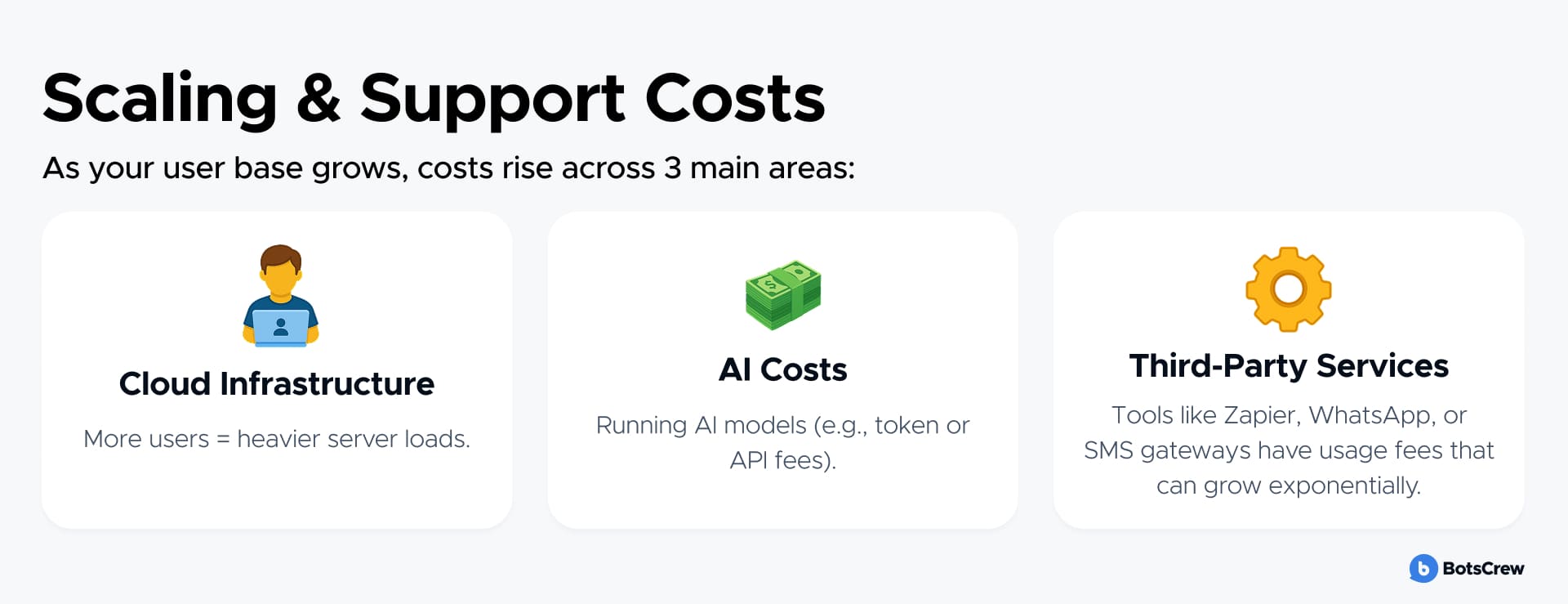
Data Quality and Readiness
💡If your data is clean and well-structured, your AI costs stay lean. But if it's fragmented or unstructured, expect additional investment in preparation and integration.
During the Discovery phase, your data's quality, structure, and accessibility are assessed. If your datasets are fragmented, inconsistent, or poorly labeled, additional work — from cleaning and standardization to migration — becomes essential before any modeling begins. Investing in data readiness upfront not only improves performance but also prevents costly rework down the line.
Interesting to know:
Large enterprises — those generating over $10 billion in annual revenue — often allocate more than $1 million per year to AI initiatives.
In contrast, small businesses with fewer than 100 employees usually invest $1,000–$5,000 annually in AI adoption.
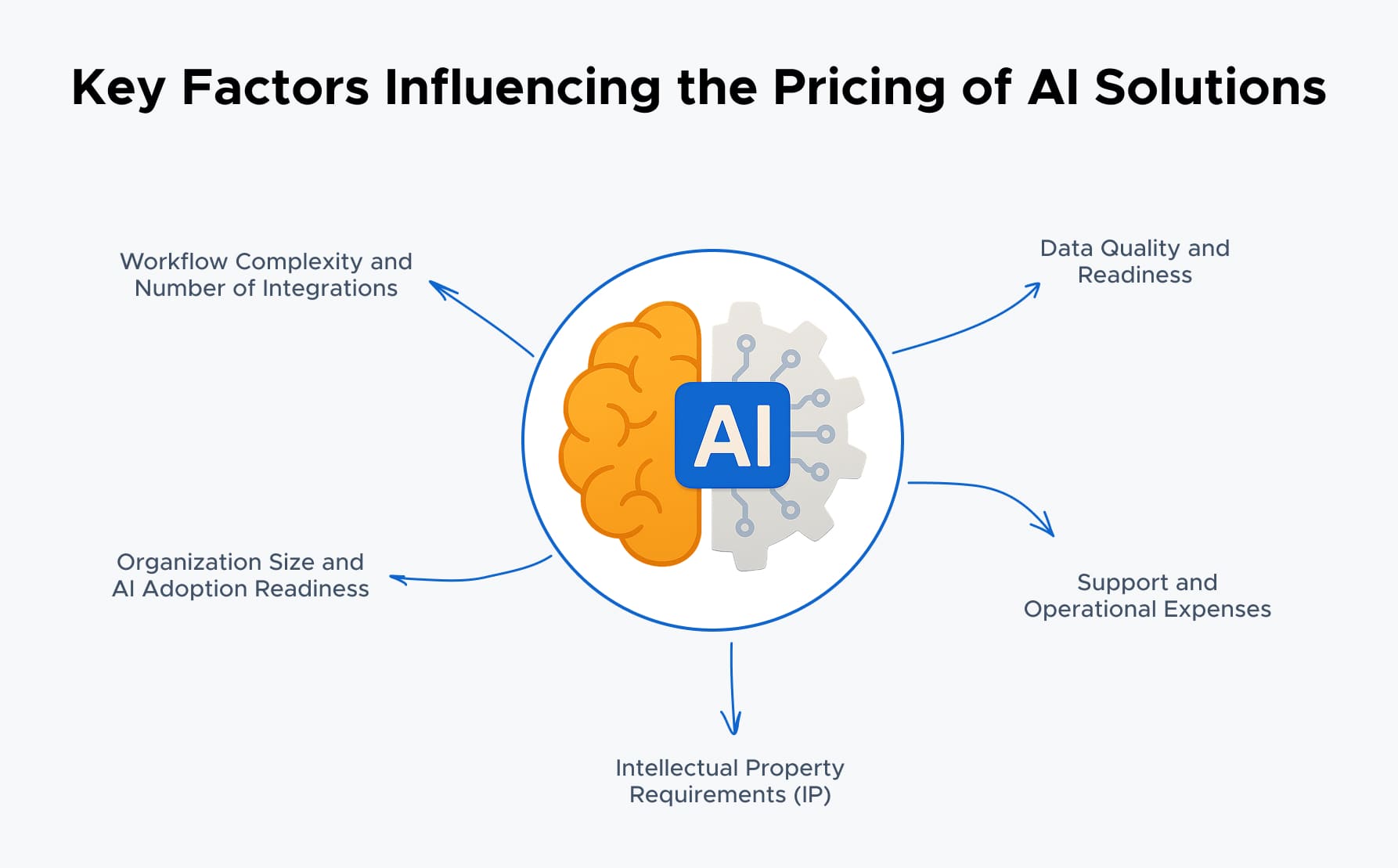
Off-the-Shelf vs Custom AI Development
When it comes to adopting AI, one size does not fit all. Companies face a strategic choice: leverage off-the-shelf tools or invest in custom-built solutions tailored to their unique data, workflows, and long-term goals. Each path has its trade-offs — from upfront costs and speed of implementation to scalability, control, and predictability of expenses.
|
Approach |
Pros |
Cons |
Typical Monthly Cost |
|
Off-the-Shelf Tools (ChatGPT, Gemini, Claude, Copilot, Chatbot Platforms) |
Quick deployment, minimal setup, low upfront cost |
Usage costs scale with users/data, limited customization |
$5–$600+ depending on platform & usage |
|
Custom AI Development |
Full control, tailored to your data, scalable & secure |
Higher upfront investment, requires compute resources & engineering |
$10–$2,000+ for compute; $50–$1,000+ for cloud & APIs and more. |
Off-the-Shelf solutions offer immediate, low-risk operational gains for non-differentiating functions. It is especially sufficient for small businesses or startups — for example, simple pre-sales agents on a website can cover most needs. However, off-the-shelf solutions are fundamentally an expense with zero asset value and the potential for vendor lock-in.
Custom AI is a strategic asset investment for mid-sized and large businesses, where workflows are complex and nuanced. These cases cannot be automated “out of the box.”
While requiring higher initial Capital Expenditure (CAPEX) and internal talent, it is the only path to building a durable competitive advantage, ensuring regulatory compliance, and achieving the lowest Total Cost of Ownership (TCO) and highest ROI over a multi-year horizon. For any function central to the company's future success, the Custom path is strategically superior.
How Much Does It Cost to Build an AI System? Breakdown by Project Type
How much does it cost to build an AI? The cost of implementing AI varies with complexity, features, and scope. Understanding the breakdown by project type helps you budget accurately and set clear expectations with stakeholders.
Which AI Project Fits Your Business? Not sure whether to start with a Proof of Concept, an MVP, or a full-scale deployment? Discover the smartest path forward with recommendations customized to your goals, resources, and budget.
Basic AI Chatbot for Website or Customer Support
Goal: Automate responses to frequent queries and reduce the workload on support/HR teams etc.
Key features: CRM integration, multilingual support, FAQ base, and simple analytics.
For instance, an e-commerce company implemented a chatbot to handle common questions about delivery, payment, and returns. The result: customer wait times dropped from 2 minutes to 15 seconds, and support team workload decreased by 40%.
⏱ Timeline: 1–2 monts
💰 Estimated cost: $10,000 – $20,000
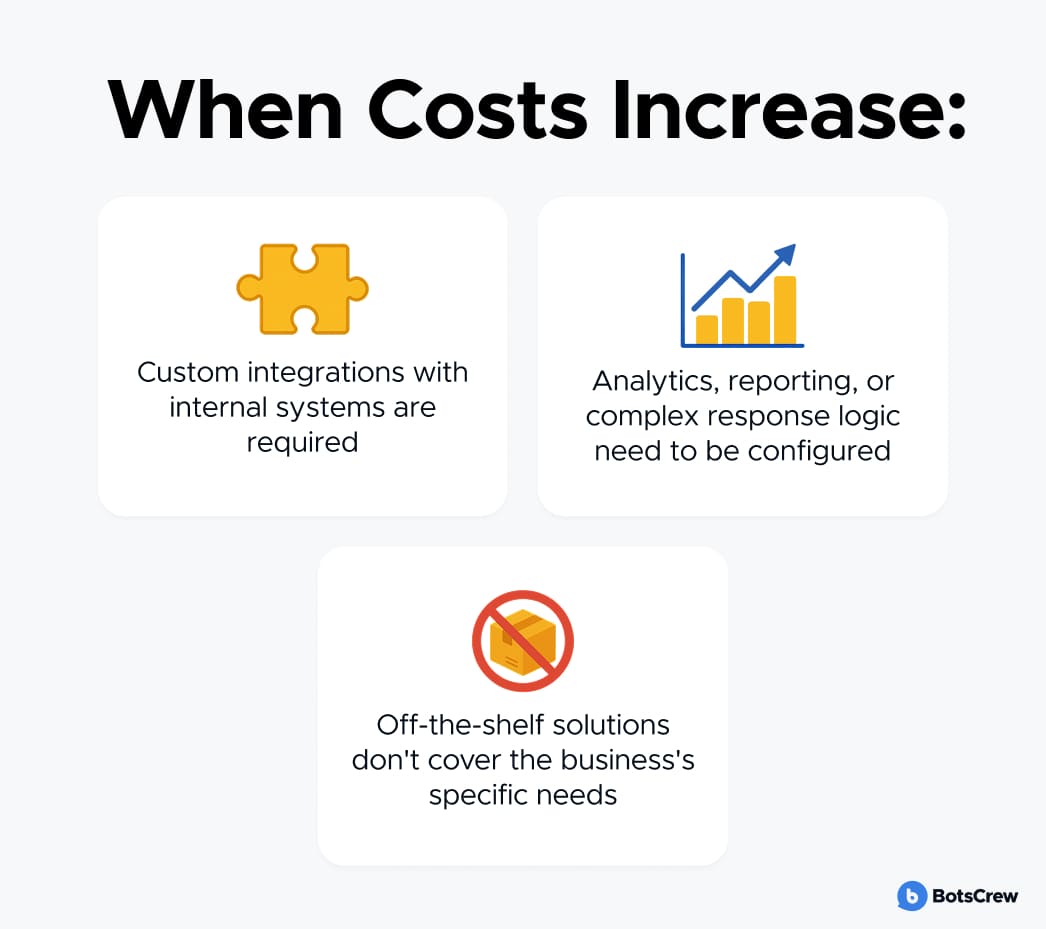
✅ Best for: Companies seeking quick automation for high-volume, repetitive queries with measurable efficiency gains.
Internal AI Assistant for Employees
Goal: Provide employees with instant access to information across internal documents, manuals, or policies. These assistants are especially valuable for HR, IT support, and sales teams.
Key features: are nearly limitless. These systems are designed to streamline specific processes within a company — from HR and sales support to content management.
For example, for one of our clients, an app for finding jobs, we built an internal AI assistant with a laser-focused mission: automating the entire content creation workflow. From start to finish, the system handles every step of the process:
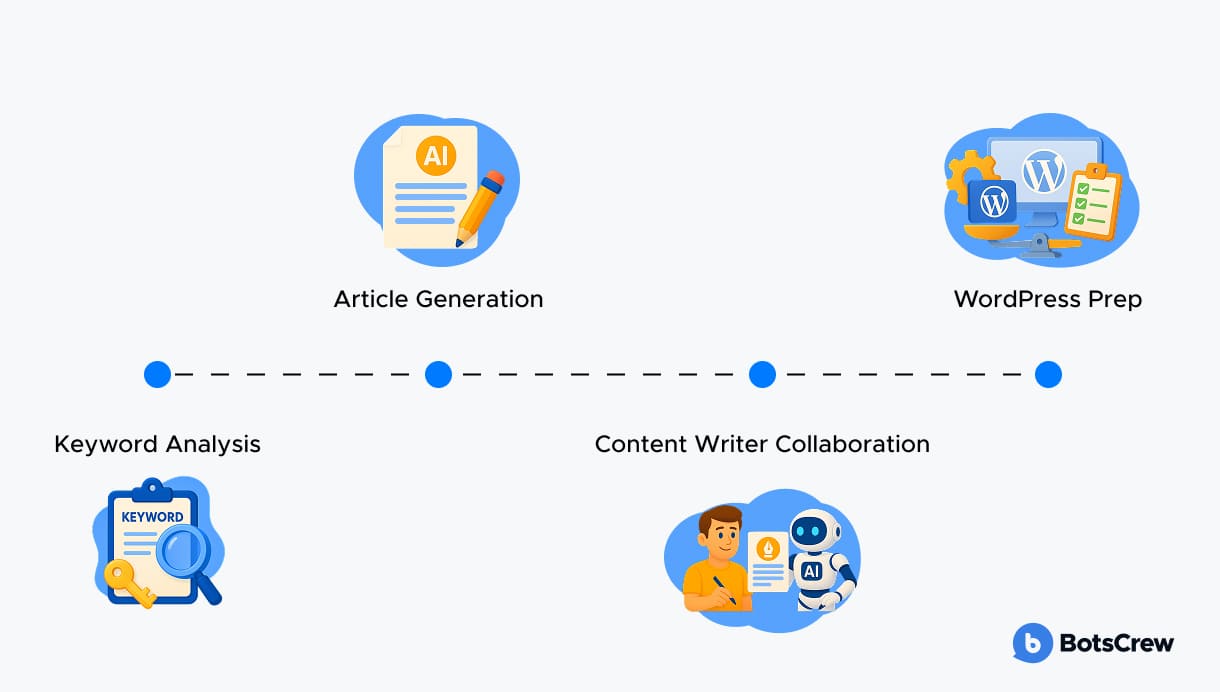
In fact, the system automates the entire content production journey — from the first keyword to the moment you hit “Publish.”
Previously, creating a single SEO article took 16 hours and cost $150–$600. With demand for fresh content growing rapidly, this process was unsustainable. Now, articles take 1.5 hours, cutting production time by 90% and reducing costs to just £1 per piece. Marketers are freed to focus on strategy, while content output scales effortlessly.
⏱ Timeline: 4–8 weeks for an MVP (Minimum Viable Product)
4–5 months for a full version (beyond MVP).
💰 Estimated cost: $10,000–$25,000 for an initial version with core functionality to validate the concept and demonstrate value
Up to $50,000 for a full version (beyond MVP).
Cost drivers:
- Number and complexity of features
- Degree of process automation
- Extent of integrations with internal systems
- Volume and format of source data (PDFs, spreadsheets, documentation)
- Security and access management
- Multilingual support
- Need for scalability across new areas, divisions, or workflows.
✅ Best for: Companies seeking to accelerate employee productivity, streamline workflows, and scale knowledge management across the organization.
AI for Analytics and Reporting
Goal: Automate the analysis of sales, marketing, or financial data — without relying on complex BI tools. These AI solutions connect with CRM, ERP, Google Analytics, or custom analytics platforms rank among the most complex to develop. They demand extensive work with data processing, advanced calculations, model training, and result visualization to deliver actionable insights.
Key features: Integration with ERP / BI / Google Sheets / SQL, Building predictive ML models, Automated reporting via API or chat interface, Dashboard creation (custom UI or Power BI/Tableau).
We developed a Sales Data AI solution for a global Textile Wholesale Distribution & Furniture Manufacturing client, designed to automate the analysis and reporting of massive data volumes. Unlike basic analytics tools, this system doesn't just extract numbers — it performs complex calculations, generates actionable insights, and supports strategic business decisions.
For large corporations, both scale and requirements escalate. The process goes beyond development, encompassing extensive testing, security coordination, and preparation for a production-ready environment to ensure reliability, compliance, and seamless integration across the enterprise.
⏱ Timeline: 3–4 months for a smaller company
6–12 months for a large enterprise (MVP)
💰 Estimated cost: $30,000–60,000 for a smaller company
Factors Driving AI Development Costs: volume and quality of data, complexity of calculations, number of data sources, custom analytics requirements.
$70,000–120,000 for a large enterprise
Reasons Budgets Can Increase: large number of internal systems and user roles to integrate, higher data security and compliance requirements, multi-level approval processes, and need to scale the solution to thousands of users.
✅ Best for: leadership teams seeking faster, data-driven decision-making.
Enterprise-Level AI Agent
Goal: Build a unified, intelligent interface for your company's data, enabling employees to interact with systems using natural language queries instead of SQL or dashboards.
For an enterprise-level AI agent, estimating costs is more complex due to the virtually unlimited range of possible use cases and functions. Example parameters:
- Company: Large manufacturing enterprise
- Annual Turnover: ~$4 billion
- Employees: 10,000+
If the AI agent is designed to integrate with ERP, CRM, supply chain, and other internal systems while covering multiple use cases simultaneously, then development involves significant technical complexity, integrations, and scalability planning — all of which directly impact budget and timeline.
⏱ Timeline: 6–12 months
💰 Estimated cost: $25,000–300,000+
Main cost factors:
- Integration with multiple internal systems (ERP, CRM, DWH)
- Authentication, logging, and audit capabilities
- On-premise or hybrid deployment
- Role-based access control
- Model fine-tuning on company-specific terminology.
✅ Best for: enterprises seeking to create a centralized, AI-powered data layer across departments.
Get a Clear AI Cost Breakdown. Share your project idea and requirements, and we'll provide a detailed estimate — including timeline, budget, and the team needed to deliver it successfully.
AI Solutions for Sales and Pre-Sales Automation
Goal: Automate repetitive sales and pre-sales tasks to boost efficiency, accelerate lead response, and free sales teams to focus on high-value activities.
Key features:
- SDR Assistants: Make outbound calls, send follow-ups, and schedule meetings automatically
- Inbound Support: Handle incoming inquiries efficiently
- Data Preparation: Aggregate and process information from ERP and CRM systems for AI-driven insights.
For one of our clients, we deployed an AI assistant that automates outbound processes and follow-ups. For another client, we developed an MVP that automated inbound calls. To make this possible, enterprise data and ERP systems had to be prepared and structured for seamless AI integration, ensuring the system could efficiently handle real-world workflows from day one.
⏱ Timeline: MVP / Initial Deployment: 4–8 weeks
Full Deployment / Expanded Functionality: 3–5 months
💰 Estimated cost: $30,000–100,000+
Main cost factors:
- Number of workflows automated
- Integrations with ERP, CRM, or other internal systems
- Volume of data processed
- Complexity of follow-up logic and AI decision-making.
✅ Best for: Mid-sized and enterprise companies aiming to increase sales efficiency, shorten response times, and scale sales operations without expanding headcount.
AI Solutions with Voice Interface (Voice Agent)
Goal: Enable natural, hands-free interaction with users by combining text and voice communication, improving accessibility, engagement, and user experience.
We built a voice-enabled AI agent for an online therapy platform, combining text and voice interactions to streamline customer support and client engagement.
The text-based chatbot, developed at a cost of approximately $20,000, included core conversation flows, CRM integration for personalized responses, multi-channel deployment across web, mobile, and social platforms, and basic analytics to monitor interactions. Adding voice functionality cost around $10,000 and brought in voice recognition, text-to-speech, integration with IVR systems for call routing, and multilingual support.
⏱ Timeline: MVP / Pilot: 4–6 weeks
Full Deployment: 3–4 months
💰 Estimated cost: $25,000–50,000, depending on complexity
Main cost factors:
- Complexity of conversation flows
- Voice recognition and synthesis integration
- Number of supported languages
- Volume of expected interactions
- Integrations with CRM, ERP, or internal systems
- Ongoing maintenance and support (usage-dependent).
✅ Best For: Companies seeking to enhance customer or employee engagement through hands-free, natural voice interactions, or to provide accessible AI interfaces across multiple channels.
AI Solutions for Recommendation Systems
Goal: Deliver personalized product or content recommendations to users, increase engagement, and drive conversions through intelligent, data-driven insights.
We built Pluggi, a chatbot enabling dispensaries to offer personalized product recommendations. Users answer three simple questions to find products, with optional follow-up from AI (ChatGPT-4) for detailed inquiries. Chatbot is integrated with eCommerce platforms, and connected to Google Analytics for performance tracking. Multilingual support covers 50+ languages, and a seamless switch to live chat ensures high-quality support.
⏱ Timeline: MVP / Basic Module: 4–6 weeks — standard recommendation functionality with single data source integration
Full Deployment / Advanced Features: 2–4 months — multi-source integrations, personalized recommendations for user segments, and advanced analytics
💰 Estimated cost: Typically $15,000–30,000 for basic functionality.
Main cost factors:
- Complexity of recommendation logic
- Number of data sources integrated
- Personalization for specific user segments
- Real-time analytics or predictive capabilities.
For more complex systems budgets can increase significantly due to intricate workflows, advanced analytics, and potential integration with voice or multi-channel interfaces.
✅ Best For: E-commerce platforms, content providers, or any business seeking to personalize user experiences, increase engagement, and boost conversions through AI-powered recommendations.
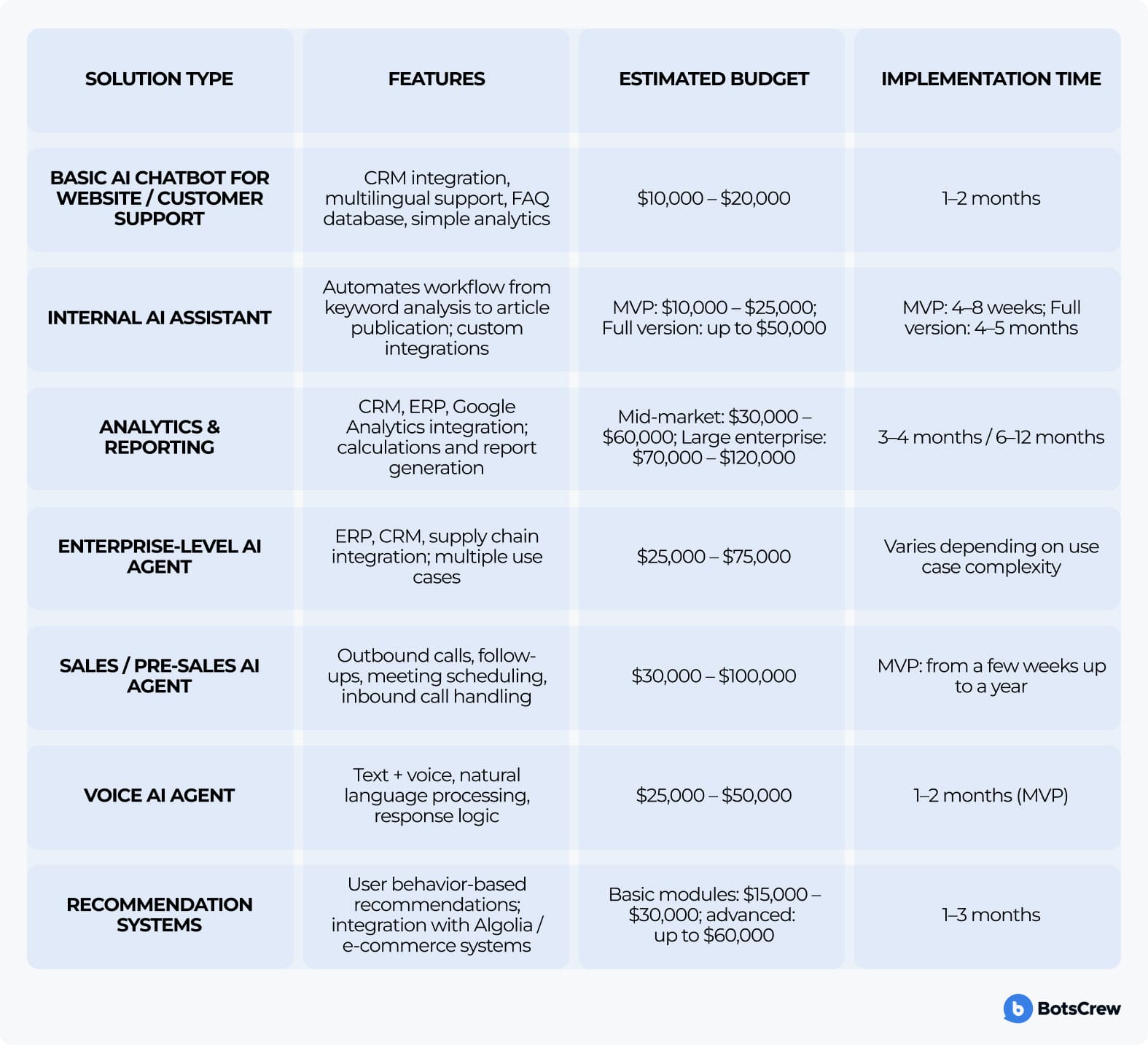
*The examples we've shared are meant to guide expectations — not dictate them. Every custom AI solution is unique, and costs can vary based on complexity and scope. As a general guideline:
MVP (Minimum Viable Product): $10,000–$25,000, depending on complexity
Full automation of a large task: An additional ~$50,000–$75,000, depending on workflow intricacy.
Curious about the true AI project cost estimation for your business? Our service team can craft a custom estimate for your MVP and map out the next phases of implementation. While a business may have dozens of potential use cases, reviewing five or so is usually enough to plan budgets, timelines, and priorities with confidence.
Some use cases can be launched very quickly. For instance, a pilot with minimal functionality — covering only part of the workflow — can go live in as little as 3 weeks, sometimes even using existing tools at minimal cost.
To unlock the full potential of AI, investing in a comprehensive MVP is essential — one that aligns with your budget and includes all critical features. On top of that, we provide consultations and AI advisory services, helping you refine your AI development cost estimation and design a strategy tailored to your unique business needs.
Maximize Your AI Investment. With a business-first mindset and proven AI expertise since 2016, we guide enterprises from concept to implementation.




